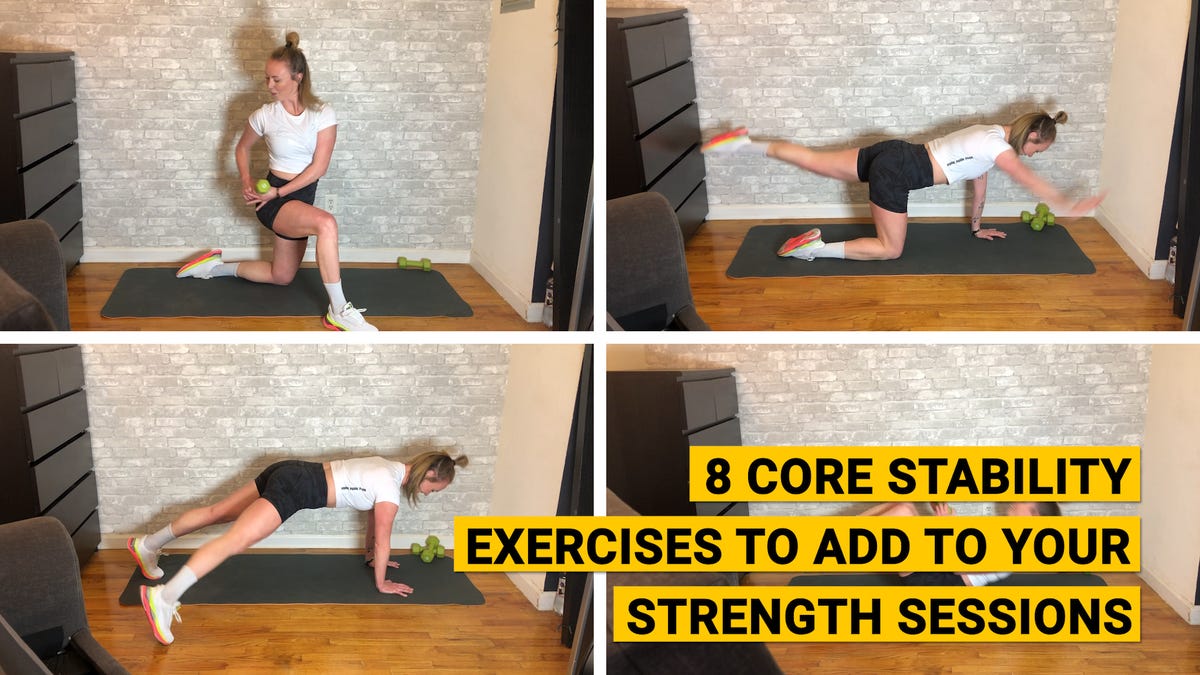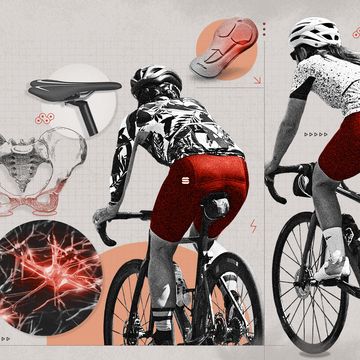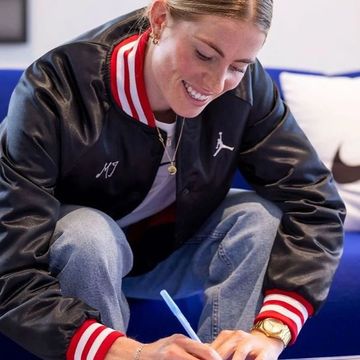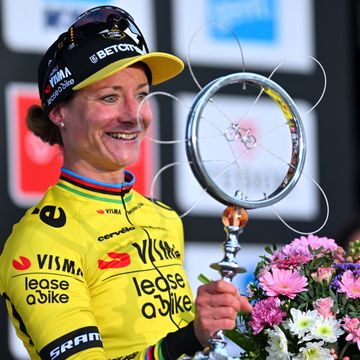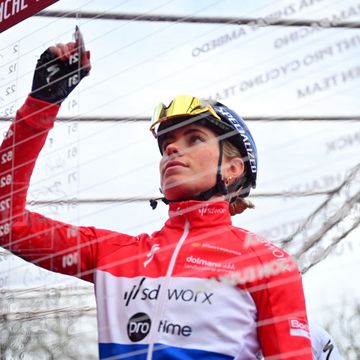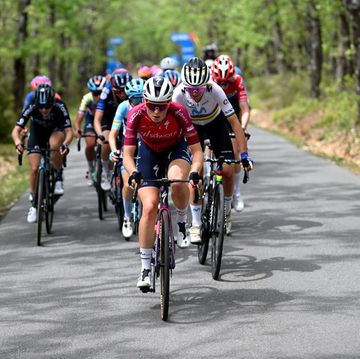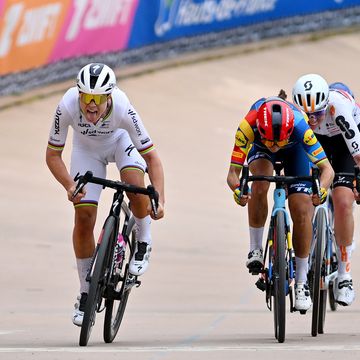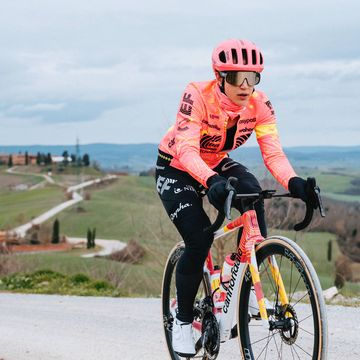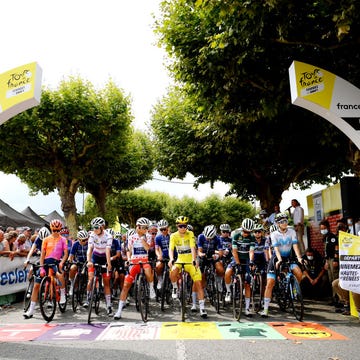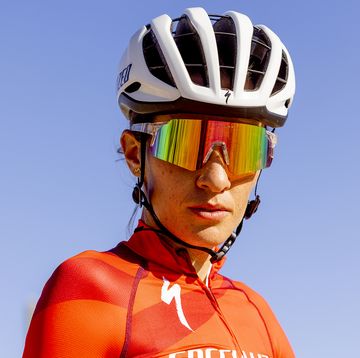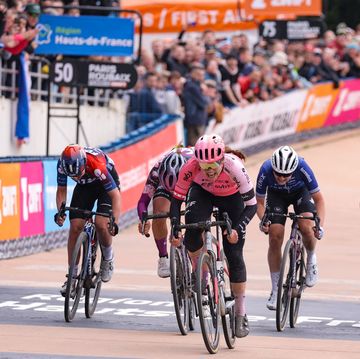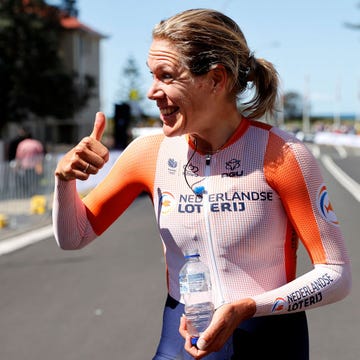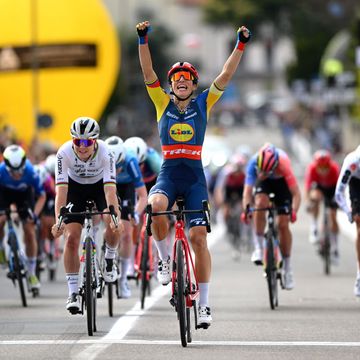The 39-year-old has accomplished a lot in the past few years, and she’s nowhere near finished. We chatted with her about racing in La Course, how she’s riding faster and stronger than ever, and why women need to support other women.
Bicycling: Congrats on the new team. Why the switch?
Kathryn Bertine: I was so excited about Wiggle-Honda. Colavita didn’t renew my contract at the start of this year. That was hard for me. They had a managerial switch and cleaned house, so to speak. That was really tricky because I started the 2014 season without a team and had to get by with guest riding. I had some really fantastic guest-riding opportunities. Optum brought me on at the beginning of the season when a few of their riders were down with injuries or illness, and then I bounced around to a couple of other teams. I thought that was how the season was going to go. I was sad about that because while I’m a little bit older, I’m racing better and faster and stronger than I ever have.
That’s not uncommon for women cyclists. Pro rider Laura Van Gilder is 50!
Exactly. So that was a challenge, to be pushing so hard for this sport but to feel like, “Oh man, I’m not able to contribute or be on a team and that’s my favorite part” When I found out La Course was happening, it was something I really wanted to be part of, and I reached out to see if there were any opportunities. And the most amazing thing happened—Rochelle Gilmore really saw the bigger picture and said, “We have the Tour de France race because of your efforts and you should be there.” That pretty much made me cry. And then we had to figure out logistically if that was something she could do, and I’m so grateful to her and Wiggle-Honda for bringing me on in the middle of the season. To get signed to a UCI trade team in the middle of the season is so rare, and this incredible gift that I’ve been given. I am going to be the happiest one on the start line there!
So what are your hopes and goals for the race?
I’ll do whatever my role on the team is and that’s up to team management. But I’ve always been a domestique, and I love that aspect. So whatever it takes for our team to thrive and whatever role they put me in, I’m so looking forward to executing that plan so Wiggle-Honda can get on the podium and take that win.
With the introduction of La Course, do you see strides being made for women’s cycling?
For sure! As you know, we’re seeing it blow up in social media. I think the one-day event is great for this year, but I think it’s going to grow and turn into the stage race that we want it to be. I think we’re seeing other people take such great initiatives. You just see a lot more people speaking out, and that’s really the only way we’ll see more change in our sport, is if participants take it upon themselves to say, “We’re going to make some change and growth happen and we’re going to do it now.”
Is there anything you’ve changed over the years in terms of routines and workouts as you’ve gotten older? You must be doing something right.
Yes, I've taken my rest days more seriously. I can rider harder and stronger than ever before, but as I've gotten older, I simply need more recovery time. If we pay attention to our body's needs, we can go for a very long time in this sport.
I make sure to get my feet up for at least a couple hours each day when the training is intense, and I find that Netflix and Apple TV help this procedure immensely. I usually take one full day away from the bike each week to catch up on the rest of the stuff life entails. I find it best not to take the day off after a very hard training day, but to spin easy the next day and then take the following day off. That way your legs don't hate you as much.
You’re one of the busiest cyclists I know. When you’re describing yourself, how do you do it: cyclist, activist, author, director?
I describe myself as tired! Honestly, I have to say that I don’t rank any necessarily in front of the other. I’m all of those things. It’s interesting, because we, as Americans, have it in our culture to want to put someone in a box when it comes to classifying people. We want to give them one title. I think one of the things I stand for is breaking down those barriers because I think it is our human nature to be more than one thing. If you are a writer or a creative person at heart, we need and thrive on various life experiences.
I’ve actually frustrated people, when they’ve tried to classify me. They ask if I’m a cyclist or a writer or an activist and I say "all of it!” We’re allowed to be more than one thing in life. We’re supposed to be.
How do you balance everything?
The time management has been tricky. I’ve always been pretty good at it. I’ve always loved doing lots of things. But if you are a pro athlete, you need your body to perform as well as it can, and that has to be your first priority. And so, for me, that means getting my training in first thing in the morning. In Tucson, we have to train early [due to the heat] and all of our group rides are early as well. That’s a really natural thing out here as opposed to the East Coast, where you may have to train later due to weather. After I have my intervals done and my energy is spent, I can sit down in front of the computer and relax. Well, “relax” isn’t the right word. I can sit down and focus on the more cerebral side of what I do as a writer or filmmaker or activist.
Did you have a background in film before Half the Road?
I didn’t. My running joke is that I truly can’t believe that people outside of my family want to watch this film. It’s the most amazing thing for me to go to screenings and see people out there watching it. And they’re not just watching it, they’re truly responding. It’s really surreal.
Did you ever think you’d be speaking on behalf of the women’s peloton?
No! I think if you have true intentions to do something positive or evoke any sort of change, I don’t think you’re focused on that aspect of “Will it take off?” or “Will it succeed?” You need to know and trust in your heart that you can make a difference and if your intentions are good, it will happen. If I find myself in the position to say, speak on behalf of the women’s peloton, I better do it right, otherwise I’m going to have a lot of very angry women coming after me, for good reason. That was the crux for making Half the Road, the little voice in my head that I followed the most. Are these women going to stand behind this film, are they going to feel accurately portrayed? That was the driving force behind very edit, every interview we did.
It seems like every time someone writes about women’s cycling, there’s a lot of criticism, no matter what. Have you found that?
People can’t always grasp that change is possible. I see it all the time. I could say something like, “‘Hey, we just got La Course by Tour de France,” and someone will chime in and say, “Yeah, but it’s not broadcast on TV anywhere.” [The race will be shown live on cable network Universal Sports.] There’s always a negative reaction and it all lives on Twitter! You have to realize that you certainly can’t please everybody, but we don’t do it for those people anyway.
We put this in the inner flap of our DVD too—ways that you can evoke change. Women have to champion other women, and that’s the only way we’re going to move forward in our society. I think men do a great job of championing women, strong men will stand for strong women and that’s fantastic. If there’s a guy out there who picks on women, he’s usually ridiculed. However, if a woman doesn’t support another woman, then it makes our entire gender look like we have no ability to move forward. I think one of the reasons that the women’s peloton trusts me is that they know I champion all of them. We need to get out of the rut of supporting the people directly around us and take it to a bigger stage. And that’s something we can do really well with social media. We can put the good news out there.
Now that Half the Road is out, are there any new projects coming up?
I always have new projects. One of the things I’d like to do, I actually wrote a screenplay a couple years back that focuses on a female protagonist who happens to be a cyclist—I figure, write what you know. It’s fiction, and something I’d love to see get into the mainstream and get a little more publicity for our sport and show what our sport can do to an audience that doesn’t gravitate toward documentaries.
But that’s the filmmaker side of me. The author side of me—you’re getting three answers—would like to write a book about the experience of these past three years in terms of what it takes to embark on that quest of social activism, what happens behind the scenes. There are a lot of stories, both public and personal, that people might find interesting.
As an athlete, that’s a good question. I have this amazing gift of racing for Wiggle-Honda for the rest of the year, and I would love to race through 2015, with the World Championships being here in the US. It’d be nice to have one more year, my swan song.
So those are the immediate ideas. If one of those works out, that’d be terrific. I also have an essay collection, The Road Less Taken, coming out in September.

